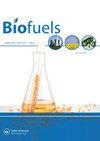Multiresponse optimization of biodiesel obtained from a mixture of soybean oil, beef tallow, and waste cooking oil
IF 2.6
4区 工程技术
Q3 ENERGY & FUELS
引用次数: 1
Abstract
Abstract Biodiesel is considered an alternative fuel that offers socio-environmental advantages over regular diesel from fossil origin. Several feedstocks can produce biodiesel, but animal fat and waste cooking oil (WCO) have become attractive due to their low cost and easy availability. These feedstocks can be mixed with traditional soybean oil to improve biodiesel’s properties, such as oxidation stability and cloud point, which would help comply with the quality parameters required by law. This work aimed to optimize pure biodiesel (B100) production from the mixture of soybean oil, beef tallow, and WCO by the methyl route and homogeneous (basic) catalysis. The simplex-centroid mixture experimental design was used to optimize yield, Induction Period (IP), and Cold Filter Plugging Point (CFPP). The results indicated that the optimum formulation was a mixture containing 50% soybean oil, 33% beef tallow, and 17% WCO. The quality parameters evaluated are within limits established by international legislation; IP of 7.11 h and CFPP of 0 °C. The real values of the R2, p-values, or t-values validate the obtained models.大豆油、牛脂和废弃食用油混合制备生物柴油的多响应优化
摘要生物柴油被认为是一种替代燃料,与化石柴油相比,它具有社会环境优势。几种原料可以生产生物柴油,但动物脂肪和废弃食用油(WCO)由于成本低且易于获得而变得有吸引力。这些原料可以与传统的大豆油混合,以提高生物柴油的氧化稳定性和浊点等性能,这将有助于符合法律要求的质量参数。本工作旨在通过甲基路线和均相(碱性)催化,以大豆油、牛脂和WCO的混合物为原料,优化生产纯生物柴油(B100)。采用单纯形质心混合实验设计对产量、诱导期(IP)和冷滤器堵点(CFPP)进行了优化。结果表明,最佳配方为50%大豆油、33%牛脂和17%WCO的混合物。所评估的质量参数在国际立法规定的范围内;7.11的IP h和CFPP为0 °C。R2、p值或t值的实际值验证了所获得的模型。
本文章由计算机程序翻译,如有差异,请以英文原文为准。
求助全文
约1分钟内获得全文
求助全文
来源期刊

Biofuels-Uk
Energy-Renewable Energy, Sustainability and the Environment
CiteScore
5.40
自引率
9.50%
发文量
56
期刊介绍:
Current energy systems need a vast transformation to meet the key demands of the 21st century: reduced environmental impact, economic viability and efficiency. An essential part of this energy revolution is bioenergy.
The movement towards widespread implementation of first generation biofuels is still in its infancy, requiring continued evaluation and improvement to be fully realised. Problems with current bioenergy strategies, for example competition over land use for food crops, do not yet have satisfactory solutions. The second generation of biofuels, based around cellulosic ethanol, are now in development and are opening up new possibilities for future energy generation. Recent advances in genetics have pioneered research into designer fuels and sources such as algae have been revealed as untapped bioenergy resources.
As global energy requirements change and grow, it is crucial that all aspects of the bioenergy production process are streamlined and improved, from the design of more efficient biorefineries to research into biohydrogen as an energy carrier. Current energy infrastructures need to be adapted and changed to fulfil the promises of biomass for power generation.
Biofuels provides a forum for all stakeholders in the bioenergy sector, featuring review articles, original research, commentaries, news, research and development spotlights, interviews with key opinion leaders and much more, with a view to establishing an international community of bioenergy communication.
As biofuel research continues at an unprecedented rate, the development of new feedstocks and improvements in bioenergy production processes provide the key to the transformation of biomass into a global energy resource. With the twin threats of climate change and depleted fossil fuel reserves looming, it is vitally important that research communities are mobilized to fully realize the potential of bioenergy.
 求助内容:
求助内容: 应助结果提醒方式:
应助结果提醒方式:


